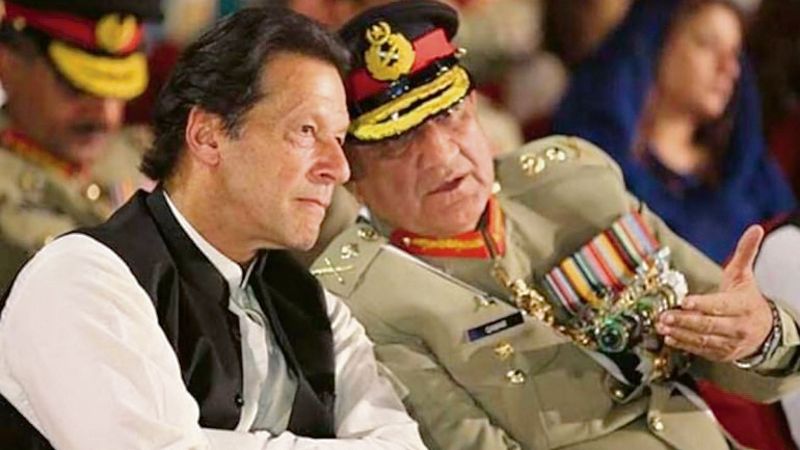
Tough time: The civil-military dynamics are likely to remain stressful in Pakistan. Twitter
Shalini Chawla
Distinguished Fellow, Centre for Air Power Studies
There have been a series of contentious developments in Pakistan in the past few weeks, reminding us of the dominance of the all-powerful Pakistan military and intensifying domestic challenges for Prime Minister Imran Khan. Historical evidence suggests a classic cycle of events in Pakistan’s democratic landscape. A promising and confident civilian leadership comes into power with full-fledged support of the military, but typically the civil-military romance seems to have a short-term expiry date and the civilian leadership struggles to complete its full tenure. In case the military has a choice of appointing another political face, the ruling party takes a blow and political leaders land behind bars on charges of corruption. At present, the political options for the military are lacking, even though its trust and relationship with Imran Khan have been seriously dented. Imran, who managed to eclipse Nawaz Sharif’s popularity and charisma in the 2018 General Election with the military’s overwhelming support, has breached the ‘red lines’ of civilian leadership by dissenting on the issue of appointment of the new ISI chief.
Imran has been facing the heat within his country from three crucial fronts. The military and the ISI have been unhappy with him on various issues of governance. However, the latest highlight of the tussle has been an unprecedented delay in an official approval of the appointment of the new ISI chief, Lt Gen Nadeem Ahmed Anjum, and Imran’s eagerness to sustain former DG ISI, Lt Gen Faiz Hameed. Imran Khan has undoubtedly gone beyond the unwritten but clearly established limits of the civilian leadership in Pakistan by challenging the military’s position.
People of Pakistan are unhappy with the government due to its inability to deliver on the election promise of ‘Naya Pakistan’, the unaffordable rise in prices of consumer goods, rising inflation and the looming energy crisis. Inflation is estimated at 8.9%. According to a consumer confidence survey conducted by Ipsos, a Paris-based market research and consulting firm, the majority of the Pakistanis hold an opinion that the nation is moving in the wrong direction (Dawn, November 25). Anger of the masses has strengthened the position of the Opposition parties who have repeatedly highlighted Imran Khan’s failures to deliver on his commitments and his inability to control Pakistan’s worsening economic challenges. The increasing debt burden is a prime concern and reports suggest that Pakistan requires gross external financing of close to $51.6 billion within a two-year period (2021-23). The external liabilities are at an alarming figure of Rs 50.2 trillion and approximately 70% of the liabilities have been added during the tenure of the PTI government. Pakistani rupee has dropped to a historic low of Rs 176 to the US dollar.
The Pakistan Democratic Movement (PDM), led by Maulana Fazlur Rehman, is trying to be back in the limelight, staging anti-government protests and rallies and accusing the PTI government of damaging Pakistan’s Islamic identity. PTI’s efforts to negotiate peace with militant group Tehrik-i-Taliban Pakistan (TTP), which has been responsible for a series of terror attacks targeting civilians and the security establishment, has drawn immense criticism.
In another complex development, the banned Tehreek-e-Labbaik Pakistan (TLP), an extremist Sunni Islamist group, seems to have gained ground and legitimacy. The chief of TLP, Saad Rizvi, was arrested in April under the Maintenance of Public Order Ordinance ahead of the TLP’s planned protests demanding the expulsion of the French envoy to Pakistan over the caricatures of Prophet Mohammad published in French magazine Charlie Hebdo. He was recently released in Lahore just before the death anniversary of TLP’s founder (and Saad Rizvi’s father), Khadim Rizvi. Reports suggest that with the help of the military’s mediation (facilitated by leading clerics), the government has signed an undisclosed agreement with the TLP and the outfit will now be functioning as a regular political party. Imran Khan’s concessional approach came as a surprise, given the fact that TLP protests were disconcertingly violent, causing deaths and destruction. The 2018 elections saw an active participation of the religious group in Pakistan’s political arena. The TLP is looking to leverage its growing popularity in the next elections. The group’s success in terms of establishing a favourable narrative and agreement is an additional indicator of alarming extremism in the political and social landscape of Pakistan.
While there was speculation regarding Imran’s thin majority and likelihood of the Opposition actually pushing to oust him, in the joint session of Parliament held on November 17, he proved his majority rather comfortably. The historic joint session passed 33 Bills, including crucial electoral Bills — the use of electronic voting machines (EVMs) in the next elections and allowing overseas Pakistanis to vote in the 2023 elections.
Does Imran’s victory in the joint session indicate a compromise between the military and him? Even though Imran’s decisions are not in sync with the military and he has failed to tackle the economic situation, he has managed to maintain his position primarily due to two factors. One, clearly the military doesn’t have an alternative. The two likely candidates, Shahbaz Sharif and Bilawal Bhutto Zardari, don’t seem to hold sufficient ground. Shahbaz lacks popularity and Bilawal doesn’t have a support base in Punjab. Two, holding the General Election at this point of time would not be in Pakistan’s favour given the fact that it requires international financial and strategic support. The civil-military dynamics are likely to remain stressful in Pakistan in the near future, leading to consistent challenges for Imran’s survival. It is highly unlikely that the all-powerful army will sit back and absorb Imran’s dissenting actions. While a premature termination of his tenure would not be easy, there is a probability of Imran and his party being reined in, further intensifying Pakistan’s socio-economic challenges. The people of Pakistan will continue to pay a heavy price for the unremitting civil-military altercations.
Join Whatsapp Channel of The Tribune for latest updates.




























